Deeply rooted
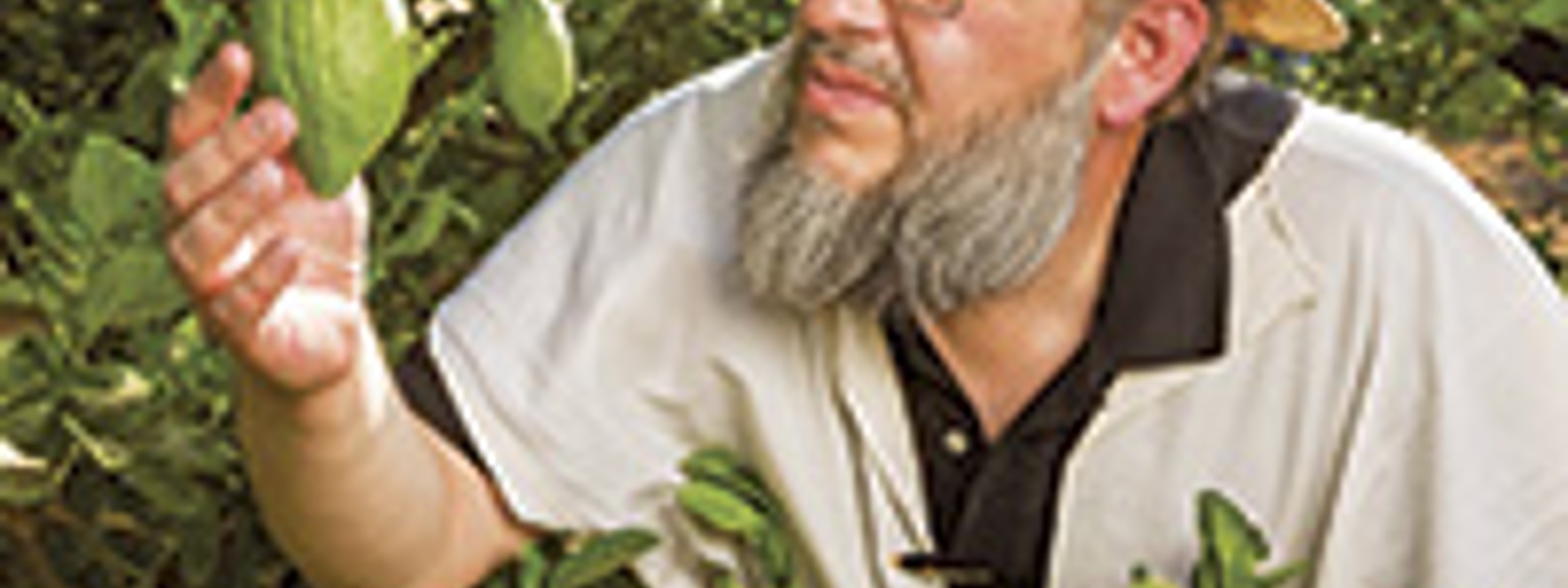
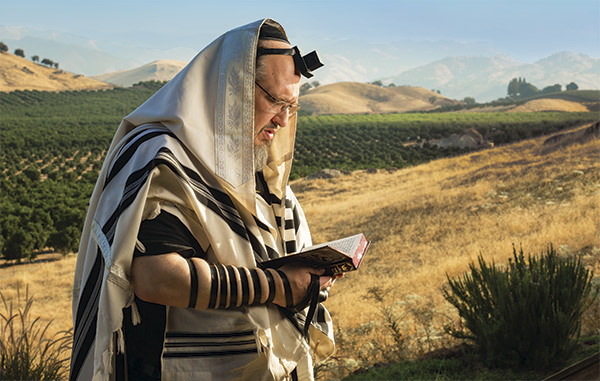
Yaakov Rothberg prays before inspecting kosher citrons in the California orchard he helped establish. Photo: © 2018 Tomas Ovalle
Each summer, businessman Yaakov Rothberg and his associates travel from Lakewood, New Jersey—home to one of the largest Orthodox Jewish seminaries, or yeshivas, in the world—to Exeter, the heart of California's citrus belt. There they spend three weeks meticulously grading etrogs in preparation for the Jewish holiday Sukkot.
"Etrog" is the Hebrew word for the citron, an ancient citrus variety that's mostly pith and has very little juice. In the culinary world, citrons are valued for their fragrant rind and pith, which are often candied for use in baked goods, made into marmalade or used to flavor vodka.
A relative of the many-fingered Buddha's hand citron, an etrog citron resembles a large, bumpy lemon. The fruit plays a vital role in Sukkot, a weeklong observance that commemorates the harvest and the 40-year period during which Jews wandered in the desert before entering the Promised Land.
Rothberg's visits to Lindcove Ranch represent a longtime partnership a local citrus-growing family has with the businessman, who sells their kosher etrogs in retail stores and to wholesalers across the U.S. for the holiday. Owned by John and Shirley Kirkpatrick and their son Greg, Lindcove Ranch is believed to be the nation's only commercial grower of etrogs.
Greg Kirkpatrick said he was once asked by Rothberg's associates if he understood the sacred
significance of the farm's contribution to Jewish communities and households across the country. The farmer's answer was immediate and heartfelt.
"There's a blessing of the fruit at the beginning of the year, so we know there are literally thousands of Jews praying for us," he said. "You feel that growing etrog citrons does bring you closer to God."
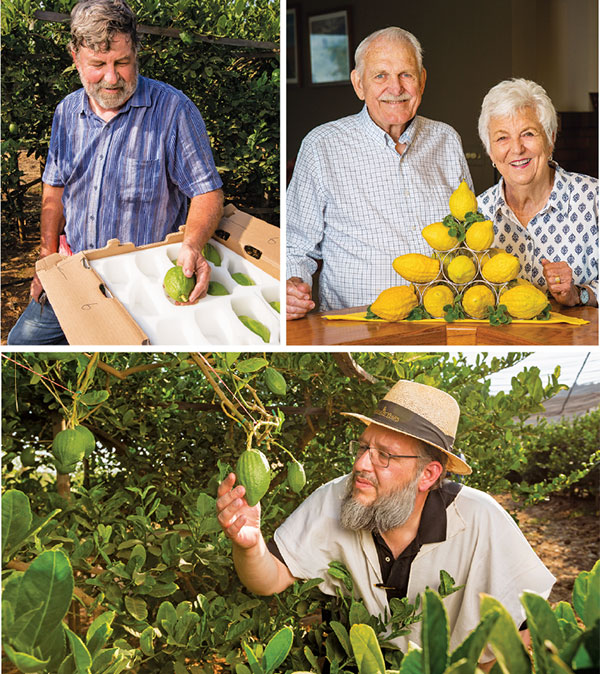
John and Shirley Kirkpatrick of Lindcove Ranch, top right, grow etrog citrons, a citrus variety used during the Jewish holiday Sukkot. Their partner in the venture, businessman Yaakov Rothberg, above, travels to the farm to inspect etrogs, which he sells in retail stores and to wholesalers across the U.S. The Kirkpatricks' son Greg, top left, carefully packs only the highest quality fruit for shipment to households for the holiday. Photos: © 2018 Tomas Ovalle
The 'goodly tree'
Etrogs are one of four plant species that form an essential ritual element of Sukkot, which begins this year at sundown on Sept. 23.
For one observance during the holiday, Jews are biblically commanded to "take a fruit of the 'goodly tree,' interpreted to be the citron, and tie together a palm branch, myrtle and willow and hold it in one hand and hold the citron in our other hand," Rothberg explained.
"These are used during the blessing, and we wave the species during the ritual of Sukkot to carry out the commandment," he said.
Each plant represents different parts of the body, Rothberg said. The citron symbolizes the heart, which he said serves as a reminder that "our hearts have to be in the right place, and that we are proud of our service to God."
"We need our hearts to be as unblemished as possible," he added. "Therein lies the secret of the citron. That's why people spend money and look for the cleanest, unblemished citron to represent the heart."
Grown under the watchful eye of an ordained rabbi, kosher etrogs for use during Sukkot must be free of blemishes such as scratches or black marks. The stem must also remain intact.
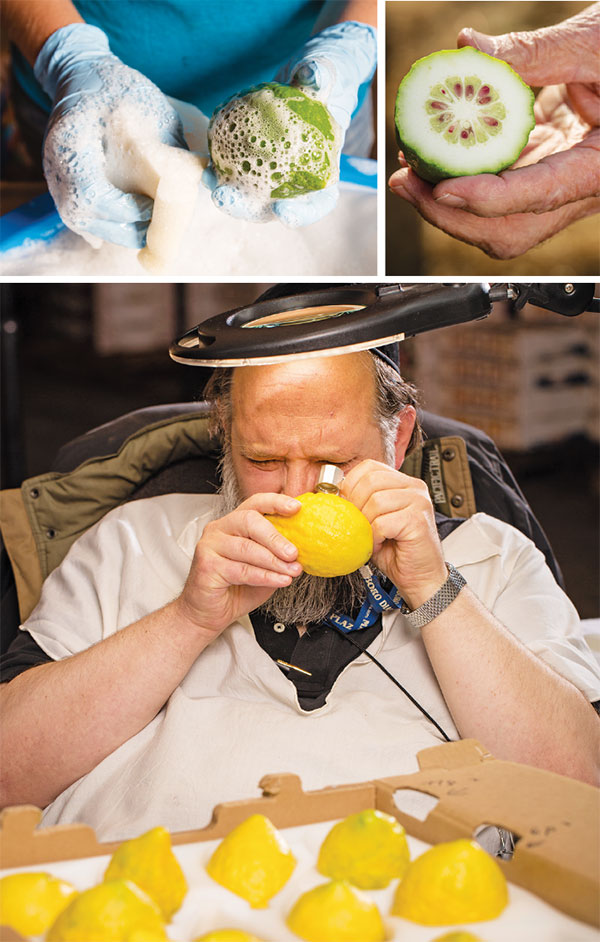
A Lindcove Ranch employee washes an etrog citron, top left, for Sukkot. The fruit, top right, has a thick, fragrant pith and little juice. Rothberg, above, closely inspects and grades Lindcove Ranch kosher etrogs. Fruit used to observe Sukkot must be unblemished, respresenting purity of heart. Photos: © 2018 Tomas Ovalle
A budding partnership
Although Jews in the U.S. have traditionally purchased the fruit from Israel, Morocco and Italy, the idea to grow a domestic supply of etrogs for Sukkot originated more than 35 years ago, during a phone call between Rothberg's brother-in-law and John Kirkpatrick, whose family grows other citrus fruit such as mandarins, oranges, lemons and limes, as well as pomegranates.
"He asked if I could help him find a citrus grower who would grow these special trees," Kirkpatrick said. "And I said, 'I think you're talking to him.' I saw it as a challenge. It was a unique crop."
Kirkpatrick said he believed his "little farm" was positioned to give the process of growing kosher etrogs the special attention it requires. To be considered kosher, the lineage of trees must be certified. Use of rootstocks, budding and grafting are forbidden, and a rabbi must oversee propagation and planting of the grove.
"Our first trees were grown from rabbinically certified seed sourced from Israeli trees of known lineage," Kirkpatrick said.
Initially, the etrog-growing project represented more of a sideline for the farm. That changed when Rothberg became directly involved.
"We got really serious when Yaakov came into the operation," Kirkpatrick said.
In the 1990s, Rothberg brought consultants to the farm and hosted a business trip to see how citrons are grown in Israel. The two worked closely together to develop the quality of the fruit, and in the process became close friends.
Lindcove Ranch has just a few acres of etrog trees, which yield about 100,000 pieces of fruit each harvest. Of those, only about 20,000 of the best candidates are selected for grading. Less than half of these are then chosen for sale. The exacting standards make the task of farming etrogs uniquely challenging.
"It is easier to grow 2,000 acres of oranges and lemons than it is to grow 1 acre of etrogs," Kirkpatrick said.
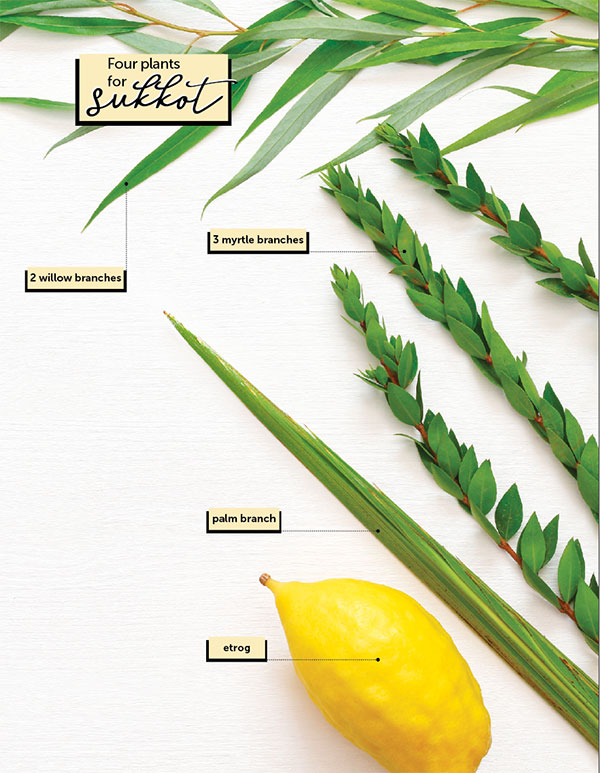
Observing the holiday of Sukkot involves fulfilling a commandment to wave a citron in one hand and a bouquet of palm, myrtle and willow branches in the other, during the blessing.
Fulfilling the commandment
Harvest of etrogs begins in early July and continues until days before Sukkot.
"Finding that picture-perfect etrog is like searching for a needle in a haystack," Rothberg said. "The cleaner it is, the less blemished it is, the more valuable the etrog is and the more meaningful it is."
Before grading the fruit, Rothberg and his associates, dressed in prayer shawls, begin with morning prayer. They also wear phylacteries, small boxes containing scripture that are bound to the head and arms with leather straps, as a reminder to keep the law.
"We pray several times a day: once in the morning, then we have an afternoon prayer, an evening prayer and on Sabbath, a night prayer," Rothberg said.
"We are guided by what's known as the Torah, the five books of the Old Testament and the prophets, Psalms and other writings," Rothberg added. "The Orthodox way of looking at things is: Adherence to the law never changes and never wavers."
Rothberg and his associates assign each piece of fruit a numerical grade. A small number of the highest-quality fruit will be sold in retail stores and the remainer to wholesalers.
"Using magnifying glasses and lights, we grade the fruit according to its shape. If the citron has a hole or a tiny defect, that renders it not kosher," Rothberg said. "We're inspecting the fruit for its value and sorting it into our various market categories."
Rothberg sells the California-grown etrogs at retail locations in Lakewood, New York, Chicago, Baltimore and elsewhere in the U.S. A small number of unblemished etrogs can sell for $60 to $80 each; lesser grades, such as those purchased for children, cost $10 to $15.
"People wait and rely on our fruit because of our ability to produce what they are looking for," Rothberg said. "They are fulfilling the commandment with our fruit, and I have a lot of pride in that."
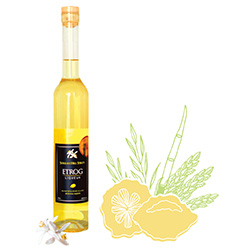
Raise a glass to citron liqueur
To get the most out of their grove at Lindcove Ranch, John and Shirley Kirkpatrick and their son Greg have found other markets for the etrogs that do not make the grade required for Sukkot. The Tulare County farmers sell the fruit in grocery stores, at farmers markets, and to distilleries that make citron-infused vodka and other spirits.
One customer, Los Angeles-based Sukkah Hill Spirits, creates artisanal, certified-kosher liqueurs, including an etrog liqueur John Kirkpatrick likens to fine-quality limoncello. Owners Howard and Marni Witkin describe it as "a lightly sweet citrus liqueur featuring the aroma of citrus blossoms."
Disappointed that the etrogs became unusable after Sukkot, Howard Witkin said his wife began experimenting in their home kitchen to find other uses, such as candy and liqueur.
"People loved it," she said.
Sold in bars, restaurants and clubs across the U.S., the artisanal etrog liqueur is a cocktail market favorite and was recognized as one of the world's Top 100 Spirits in 2015 by Wine Enthusiast magazine.
"We're starting with this wonderful, ancient, beloved and delicious fruit, and turning it into something that tastes good and smells good," Howard Witkin said. "If you want a gin and tonic and you want it to be something special, you add a little etrog liqueur and it smells like the Garden of Eden with all of these wonderful botanicals, oils and citrus."

